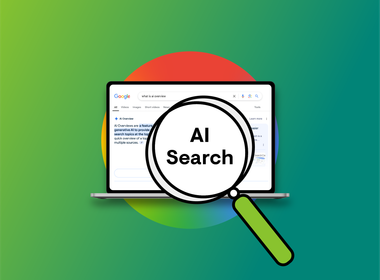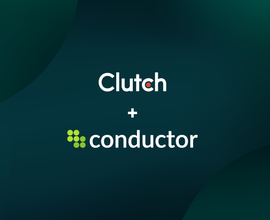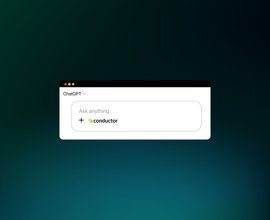AI Search & How It Differs from Traditional Search
The world of search is undergoing its most significant transformation yet. For years, we’ve relied on a list of blue links, but AI is reshaping how we find information and get found by users. Instead of just delivering you to a source of information, AI search is dynamic, allowing you to carry on a conversation with the AI to get the answers you need and ask direct follow-up questions.
As AI search grows in popularity and power, it’s clear that brands that don’t understand AI search won’t appear in AI responses.
What is AI search?
AI search is an advanced search experience that uses artificial intelligence, generally large language models (LLMs), to understand a user’s question and seamlessly generate an answer. Rather than giving you a list of links to find the answer yourself, the goal of AI search is to provide a direct response to a question without the user needing to look for the answer themself.
It’s designed to be more of a conversation or a consultation with a knowledgeable assistant rather than a simple retrieval of indexed documents. Platforms like Google with its AI Overviews , Perplexity , and ChatGPT Search are leading this shift, transforming how we access information online.
How does AI search differ from traditional search
The fundamental difference between AI search and traditional search is the output.
Traditional search engines (like Google in its classic format) function like a digital librarian. You give them keywords, and they return a catalog of ranked links (the "blue links") that they believe are relevant. It's then your job to visit those links to find the answer you need.
AI search aims to understand the context of a request instead of just the keywords. From there, it breaks down the top content sources it’s been trained on to provide a direct answer, allowing the user to ask follow-up questions and carry on a conversation. In that way, AI search is like a research assistant, while traditional search is like looking through the shelves and books in a library.
What are mentions in AI search?
In AI search, a mention refers to when an AI-generated response directly mentions the name of a brand, product, or service without directly linking to the corresponding website.
For example, if a user asks for the "best project management tools," the AI might generate a paragraph that names several options, such as Asana , Trello , and Monday.com . While these brands don't get a direct link, being named in the AI's answer positions them as key players in the market, influencing user perception and consideration.
A mention means that your brand was mentioned. There isn't necessarily a link or anything like that; it just means that you were mentioned.
A citation refers to the links that you see that are either embedded or on the side of the AI response. They mean that the information within the response was actually taken from your site, and you were linked to.
Check out the screenshot below. The AI overview for the query “best project management tools” mentions Trello, Monday.com, Asana, and others, but doesn’t link to any of these sites specifically.

What are citations in AI search?
A citation in AI search is a direct, clickable link to a webpage that the AI used as a source when generating its answer.
These are often presented as small, numbered icons, links within the text, or a list of source cards alongside or below the AI-generated overview. Think of citations as the new currency of organic traffic from AI search, as they provide a direct path for a user to visit your website. However, mentions are still just as important as citations, since AI search provides users with a direct answer, they may not feel the need to click on a citation.
Both mentions and citations are important, but I actually think that getting mentioned is probably more important than getting cited, because people don't look at the citations on AI responses that much. Oftentimes citations are hidden at the bottom, or on the sidebar on the right-hand side.
You’re relying on someone scrolling the rest of the page to see the citation, to see you. However, as a user, I am reading the AI response, for sure. It’s almost like you’re seeing a billboard or a commercial. Brand presence is pretty big in AI search right now.
Take a look at this same screenshot from earlier. Although the AI Overview mentions Trello, Asana, and Monday.com it cites Reddit and Zapier by actually linking to their webpages on the side of the response.

How AI search impacts organic traffic
The rise of AI search is causing a significant shift in how organic traffic is distributed, measured, and targeted. AI search often provides a user with a direct, detailed answer to their question, leading to more “zero-click searches” where users get the information they need without having to click on any pages for it.
That doesn’t mean the end of organic traffic, though. It means the nature of that traffic is changing. Clicks that do come from AI search citations are often from users with higher intent who are looking to dive deeper into a topic after reading the AI summary. As a result, while traffic volume might decrease for some, the quality and engagement of the traffic that does arrive can be significantly higher.
This shift pressures businesses to create truly unique, in-depth, and authoritative content that AI models will recognize as a valuable source worthy of citation, rather than content that can be easily summarized and replaced.
How much traffic are websites losing to AI search?
The shift to AI-driven answers is having a direct and measurable impact on website traffic, particularly for publishers and sites that rely on informational queries. While the exact numbers vary by industry and study, multiple data sources from early and mid-2025 paint a clear picture of declining organic clicks.
According to our research into the traffic impact of Google’s AI Overviews, 14% of the 118 million keywords analyzed in May 2025 generated an AI Overview. That’s a significant amount of keywords that have an AI response that could draw traffic away from the blue links appearing below.
Ultimately, the transition from traditional to AI search is a critical one for both users and brands. Instead of search engines providing you a map to find an answer on your own, AI brings you directly to your destination with a clear, digestible answer. While the rise of zero-click searches presents a challenge, it also creates an opportunity to attract higher-intent users through valuable, citation-worthy content. Adapting to this reality isn't just an option; it's essential for staying visible and relevant in the future of search.

![Patrick Reinhart, VP, Services and Thought Leadership, [object Object]](https://cdn.sanity.io/images/tkl0o0xu/production/9bc72298b24ad01b732de4c3376f79546d20f81c-3542x3542.png?fit=min&w=100&h=100&dpr=1&q=95)
![Wei Zheng, Chief Product Officer, [object Object]](https://cdn.sanity.io/images/tkl0o0xu/production/dcfa62c0fe34ba0c31f910b818874cd160ad8839-3542x3542.png?fit=min&w=100&h=100&dpr=1&q=95)






